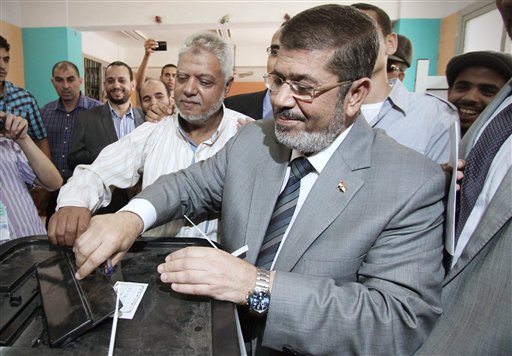By MAGGIE MICHAEL
Associated Press
CAIRO
The candidate of Egypt’s Muslim Brotherhood won a spot in a runoff election, according to partial results Friday from Egypt’s first genuinely competitive presidential election. A former prime minister and a leftist were in a tight race for second place and a chance to run against him to become the country’s next leader.
The runoff will be held on June 16-17, pitting the two top contenders from the first round of voting held Wednesday and Thursday. The victor is to be announced June 21.
The landmark vote _ the fruit of last year’s uprising that toppled longtime leader Hosni Mubarak _ turned into a heated battle between Islamist candidates and secular figures rooted in Mubarak’s old regime. The most polarizing figures in the race were the Muslim Brotherhood’s Mohammed Morsi and former air force commander and former prime minister Ahmed Shafiq, a veteran of Mubarak’s rule.
By midday Friday, the counting had been completed in at least 20 of the country’s 27 provinces, representing around half the votes cast _ though workers were still plowing through the paper ballots from Egypt’s biggest metropolis, the capital Cairo and its sister city Giza. The election commission said turnout in the election’s first round was about 50 percent of more than 50 million eligible voters.
Morsi was in the lead with 28 percent of the ballots so far, according to the independent newspaper Al-Masry Al-Youm, which was compiling reports from counting stations. That is likely enough to secure him a spot in the runoff.
But the race for second place was neck-and-neck between Shafiq and leftist Hamdeen Sabahi, who was a darkhorse during months of campaigning but had a surprising surge in the days before voting began as Egyptians looked for an alternative to both Islamists and the former regime figures known as “feloul” or “remnants.”
Sabahi is a leftist who claims the mantle of the nationalist, socialist ideology of Gamal Abdel-Nasser, Egypt’s president from 1956 to 1970.
Earlier in the day, Al-Masry Al-Youm’s tally had Shafiq with 21 percent of the vote so far, and Sabahi at 20 percent. But then Sabahi scored a surprise win in the Mediterranean coastal city of Alexandria, Egypt’s second largest city, where he came in first and Morsi and Shafiq lagged far behind. That vaulted Sabahi into a narrow second place lead for the moment, though several Shafiq strongholds in the Nile Delta had still to report.
The count from Cairo and Giza was not expected to be finished until late Friday or early Saturday, Mounis said.
Alexandria is the traditional stronghold of both the Muslim Brotherhood and the ultraconservative Islamists known as Salafis. But the powerful Salafi vote there was split between Islamist candidates. The result is “a great loss to the Brotherhood who lost their credibility in the street,” Mounis said.
The Brotherhood is hoping for a presidential victory to seal its political domination of Egypt, which would be a dramatic turnaround from the decades it was repressed under Mubarak. It already holds nearly half of parliament after victories in elections late last year.
The group has promised a “renaissance” of Egypt, not only reforming Mubarak-era corruption and reviving decrepit infrastructure, but also bringing a greater degree of rule by Islamic law. That prospect has alarmed more moderate Muslims, secular Egyptians and the Christian minority, who all fear restrictions on civil rights and worry that the Brotherhood shows similar domineering tendencies as Mubarak.
A Morsi verus Shafiq runoff would likely be a particularly heated race.
Each has repeatedly spoken of the dangers, real or imaginary, if the other becomes president. Morsi has said there would be massive street protests if a “feloul” wins, arguing it could only be the result of rigging.
Shafiq, on his part, has said it would be “unacceptable” if an Islamist takes the presidential office, echoing the rhetoric of Mubarak, his longtime mentor who devoted much of his 29-year rule to fighting Islamists. Still, Shafiq’s campaign has said it would accept the election’s result.
And each fires up strong emotions among the public.
Shafiq drew support among Egyptians who fear Islamists or want a perceived “strongman” to bring stability after 16 months of economic and political turmoil and bloodshed since Mubarak’s fall. But he also raises the venom of many who see him as another Mubarak-style autocrat, rooted in a regime that was notorious for corruption and police brutality.
Secular Egyptians fear the prospect of greater religion in government if Morsi wins. Moreover, the Brotherhood faced a backlash from many of the voters who supported it in the parliament election but later grew disillusioned. Some accused it of trying to overly monopolize power like Mubarak’s ruling party once did.
Morsi’s showing in the partial results was a considerable drop from the around 50 percent support the Brotherhood received in the parliament vote.
Still, Morsi benefited from the might of the Brotherhood’s well-organized electoral machine, the nation’s strongest.
At another station Thursday in the Cairo district of el-Zawiya el-Hamra, several women in line to vote debated.
Somaiya Imam, still undecided on whom to choose, replied with a reference to Islamist candidates, saying: “Don’t you think we should vote for the candidate who holds the Quran?”

COMMENTS
Please let us know if you're having issues with commenting.